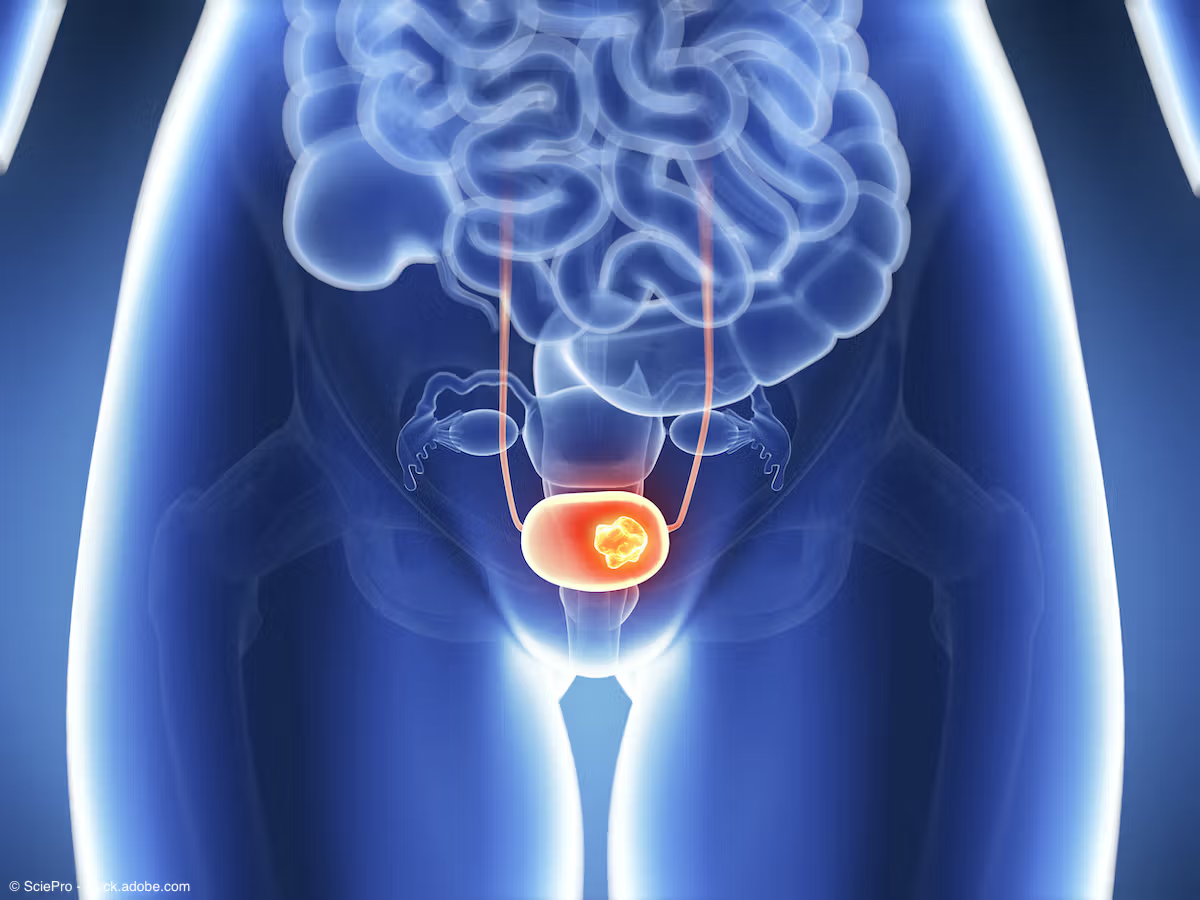News
Article
Clinical trial program of nadofaragene firadenovec in NMIBC expands
Author(s):
The 3 new additional studies are the ABLE-22, ABLE-32, and ABLE-42 clinical trials.
Ferring Pharmaceuticals has announced the expansion of their ADSTILADRIN in Bladder Cancer (ABLE) clinical trial program to include 3 additional studies of nadofaragene firadenovec-vncg (Adstiladrin) in non–muscle-invasive bladder cancer (NMIBC).1
These trials add on to the 2 existing trials within the NMIBC clinical trial program: the Japan Phase 3B Study and the ABLE-41 trial.

Nadofaragene firadenovec received FDA approval in December 2022 for the treatment of adult patients with high-risk, BCG-unresponsive NMIBC with carcinoma in situ (CIS) with or without papillary tumors. The intravesical gene therapy was recently made fully available to this patient population in the US.2
“ADSTILADRIN is an established monotherapy treatment option for patients with BCG-unresponsive NMIBC disease, an area where patients’ treatment options have been severely limited for decades,” said Pierre-Yves Berclaz, MD, PhD, Executive Vice President and Chief Science and Medical Officer for Ferring Pharmaceuticals, in a news release on the expansion.1 “These new trials underscore Ferring’s commitment to create solutions for patients by enlarging the body of evidence for this novel nonreplicating gene therapy.”
The 3 additional studies are the ABLE-22, ABLE-32, and ABLE-42 clinical trials.
ABLE-22 is an open-label, multi-center, randomized, phase 2 trial to evaluate the safety and efficacy of nadofaragene firadenovec alone or in combination with chemotherapy (gemcitabine or docetaxel) or immunotherapy (pembrolizumab [Keytruda]) in adult patients with BCG-unresponsive NMIBC.
ABLE-32 is a randomized, controlled, phase 3b trial to assess the safety and efficacy of nadofaragene firadenovec vs observation in patients with intermediate-risk NMIBC.
ABLE-42 is an open-label, multicenter, phase 4 trial to explore the efficacy of retreatment with nadofaragene firadenovec in patients with high-grade BCG-unresponsive NMIBC with CIS with or without papillary tumors who had been previously treated and did not respond to the therapy at 3-month follow-up.
These trials add on to the 2 existing trials within the NMIBC clinical trial program: the Japan Phase 3B Study (000381; NCT05704244) and the ABLE-41 trial (NCT06026332).
The Japan 3B study is an ongoing single-arm bridging study of nadofaragene firadenovec in patients with high-grade, BCG-unresponsive NMIBC.
ABLE-41 is an ongoing phase 4 non-interventional real-world evidence study of adult patients with high-risk, BCG-unresponsive NMIBC who are being treated with nadofaragene firadenovec in a US-based routine clinical setting. The study will collect data from patients, caregivers, and prescribing physicians to assess the early utilization, experiences, safety, and efficacy outcomes with nadofaragene firadenovec in a real-world clinical setting.3
The first patient was enrolled in the ABLE-41 trial in September 2023.4 In total, the study plans to enroll approximately 800 participants.
Patients eligible for the trial are those who were prescribed and scheduled to receive treatment and had not previously received nadofaragene firadenovec in a clinical trial, and those who received their first instillation of the therapy after September 5, 2023, but before the site was activated in the trial.
The primary outcome measure for the study is the complete response (CR) rate, as assessed at 3 months and 1 year from first therapy instillation. Secondary outcome measures include treatment patterns of use, the duration of CR, recurrence-free survival, progression-free survival, overall survival, and safety.
Participants included in the trial will be followed for 24 months or until study discontinuation or withdrawal. Patient experiences will be assessed using the EuroQol 5 Dimension 5 Level quality-of-life questionnaire to measure mobility, self-care, usual activities, pain/discomfort, and anxiety/depression. Caregiver experiences will be assessed using the Work Productivity and Activity Impairment questionnaire to measure the effect on paid and unpaid work.
Completion of the ABLE-41 study is expected in 2026.
References
1. Ferring adds three new studies to non-muscle invasive bladder cancer clinical trial program with ADSTILADRIN (nadofaragene firadenovec-vncg). News release. Ferring Pharmaceuticals. Published online and accessed April 16, 2024. https://ferringusa.com/?press=ferring-adds-three-new-studies-to-non-muscle-invasive-bladder-cancer-clinical-trial-program-with-adstiladrin-nadofaragene-firadenovec-vncg
2. Ferring announces full availability of ADSTILADRIN (nadofaragene firadenovec-vncg) in the U.S. News release. Ferring Pharmaceuticals. January 16, 2023. Accessed April 16, 2024. https://ferringusa.com/?press=ferring-announces-full-availability-of-adstiladrin-nadofaragene-firadenovec-vncg-in-the-u-s
3. Phase 4 study evaluating use of ADSTILADRIN (nadofaragene firadenovec-vncg) in real-world setting. News release. Ferring Pharmaceuticals. January 24, 2024. Accessed April 16, 2024. https://ferringusa.com/?press=phase-4-study-evaluating-use-of-adstiladrin-nadofaragene-firadenovec-vncg-in-real-world-setting
4. First bladder cancer patient dosed with commercially available intravesical gene therapy ADSTILADRIN (nadofaragene firadenovec-vncg). News release. Ferring Pharmaceuticals. September 12, 2023. Accessed April 16, 2024. https://ferringusa.com/?press=first-bladder-cancer-patient-dosed-with-commercially-available-intravesical-gene-therapy-adstiladrin-nadofaragene-firadenovec-vncg
Newsletter
Stay current with the latest urology news and practice-changing insights — sign up now for the essential updates every urologist needs.















